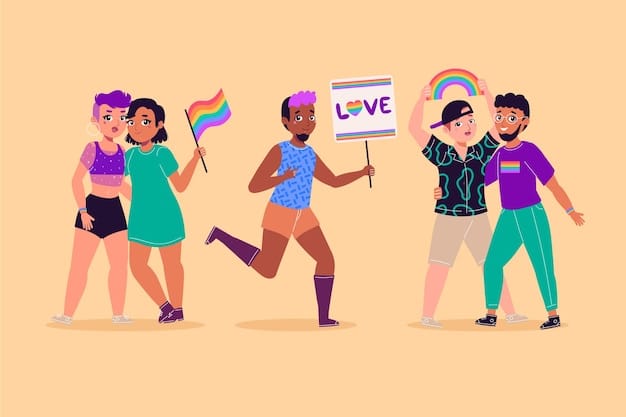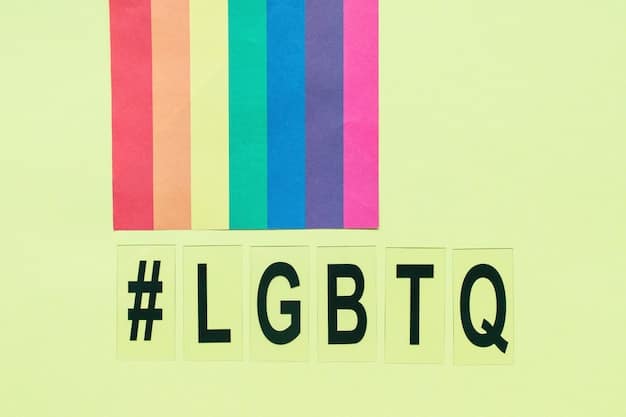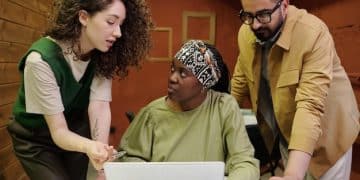Understanding the Rise in LGBTQ+ Hate Crimes: What Actions Can You Take?

Understanding the 15% Increase in Hate Crimes Targeting LGBTQ+ Individuals: What Can You Do? involves recognizing the causes behind this surge, such as socio-political factors and biased narratives, and taking actionable steps like supporting LGBTQ+ organizations, promoting inclusive education, and advocating for policy changes.
The recent 15% increase in hate crimes targeting LGBTQ+ individuals is a stark reminder of the prejudice and discrimination that still exist in our society, so let’s delve into understanding the 15% increase in hate crimes targeting LGBTQ+ individuals: what can you do? to combat this alarming trend, and what measures can be taken to ensure safety and inclusivity for all.
Understanding the Alarming Increase in LGBTQ+ Hate Crimes
The spike in hate crimes against the LGBTQ+ community is a deeply concerning issue, as it reflects broader social and political tensions. To effectively address this problem, we must first understand the multitude of factors contributing to this rise, enabling us to make informed decisions and take meaningful action.
Let’s explore some key elements to consider.
Socio-Political Factors
Societal attitudes and political rhetoric profoundly influence the prevalence of hate crimes. Increased polarization and the spread of misinformation create a hostile environment for marginalized communities, including LGBTQ+ individuals. Legislation and policies that target LGBTQ+ rights can also embolden discriminatory behavior.
Biased Narratives and Stereotypes
Prejudicial narratives perpetuate misunderstandings and animosity towards LGBTQ+ individuals. These narratives often stem from ignorance, fear, and deeply ingrained biases. Understanding these misconceptions is the first step in dismantling them and fostering empathy.

Combating these issues requires a multi-pronged approach. Some strategies include:
- Promoting Inclusive Education: Implementing comprehensive educational programs that foster understanding and acceptance of LGBTQ+ identities.
- Supporting LGBTQ+ Organizations: Providing resources and assistance to organizations that advocate for LGBTQ+ rights and provide support to victims of hate crimes.
- Advocating for Policy Changes: Working to enact laws and policies that protect LGBTQ+ individuals from discrimination and violence.
By acknowledging the various elements contributing to the exacerbation of hate crimes and actively working against them, we can strive to foster a society that is more equitable, understanding, and safe for all members of the LGBTQ+ community.
The Role of Legislation and Policy
The laws and policies in place, or the lack thereof, can significantly impact the safety and well-being of LGBTQ+ individuals. Understanding the current legal landscape is essential for advocating for change and ensuring equal protection under the law.
So, how do policy and legislation intersect with rising hate crimes?
Federal Protections and Gaps
While some federal laws offer protections against hate crimes, gaps remain in coverage for LGBTQ+ individuals. The lack of explicit federal non-discrimination protections in areas such as housing, employment, and public accommodations leaves many vulnerable to discrimination and violence.
State and Local Laws
State and local laws vary widely regarding LGBTQ+ protections. Some states have robust anti-discrimination laws, while others offer little to no protection. This patchwork of legislation creates inconsistencies in safety and equity across the country.

Understanding these factors and disparities should impact the following actions you take:
- Supporting Comprehensive Federal Legislation: Advocating for federal laws that explicitly prohibit discrimination based on sexual orientation and gender identity.
- Promoting State and Local Protections: Working to enact and strengthen anti-discrimination laws at the state and local levels.
- Holding Elected Officials Accountable: Ensuring that elected officials prioritize LGBTQ+ rights and support inclusive policies.
By addressing legal gaps and advocating for comprehensive protections, we can create a more just and equitable society for LGBTQ+ individuals.
Community Support and Resources
Having a strong social support system is invaluable for LGBTQ+ individuals, especially in the face of increased hate crimes, and community organizations provide vital resources, support, and advocacy.
Access to the right resources is a game changer, so let’s dive in.
Local LGBTQ+ Centers
LGBTQ+ centers offer a range of services, including counseling, support groups, educational programs, and advocacy. These centers provide safe spaces where individuals can connect with others, access resources, and build community.
National Organizations
National LGBTQ+ organizations work to advance LGBTQ+ rights through advocacy, education, and legal action. These organizations offer resources, information, and support to individuals and communities across the country.
Here are valuable ways you can show support:
- Volunteering Time: Contributing your time and skills to support LGBTQ+ organizations and initiatives.
- Making Donations: Providing financial support to organizations that offer vital services and advocacy.
- Raising Awareness: Educating yourself and others about LGBTQ+ issues and promoting understanding and acceptance.
By engaging with and supporting these community resources, we can bolster the resilience and well-being of LGBTQ+ individuals and promote a more inclusive society.
Education and Awareness Campaigns
Education and awareness campaigns are critical tools for combating prejudice and promoting understanding, as they help dispel myths, challenge stereotypes, and build empathy.
What are some ways to use education and awareness?
Challenging Stereotypes
Many misconceptions about LGBTQ+ identities can perpetuate discrimination and hostility. Awareness campaigns can challenge these stereotypes by presenting positive and accurate representations of LGBTQ+ lives and experiences.
Promoting Inclusion
Educational initiatives can foster a more inclusive environment by teaching about LGBTQ+ history, culture, and contributions. Incorporating LGBTQ+ topics into school curricula and workplace training programs can promote understanding and acceptance.
Consider these actions:
- Supporting Inclusive Curricula: Advocating for the inclusion of LGBTQ+ topics in school curricula to promote understanding and combat prejudice.
- Participating in Awareness Campaigns: Engaging in community events, workshops, and online activities that raise awareness about LGBTQ+ issues.
- Sharing Personal Stories: Sharing personal stories and experiences to humanize LGBTQ+ individuals and challenge stereotypes.
By investing in education and awareness, we can create communities that embrace diversity and where all individuals are valued and respected.
Being an Ally: Practical Steps
Being an ally to the LGBTQ+ community involves taking active steps to support and advocate for their rights and well-being. Allyship requires more than just passive acceptance; it demands active engagement and commitment.
Here are some practical steps you can take to support the LGBTQ+ community.
Speak Out Against Discrimination
When you witness or hear discriminatory remarks or behaviors, speak out against them. Silence can be interpreted as agreement, so it’s important to challenge prejudice whenever you encounter it. Intervening can disrupt cycles of bias and violence.
Use Inclusive Language
Using inclusive language shows respect for LGBTQ+ identities and experiences. Be mindful of your language and avoid using terms that perpetuate stereotypes or exclude individuals, and use correct pronouns.
Further solidify your ally label by:
- Educating Yourself: Learning about LGBTQ+ issues, history, and culture to become a more informed and effective ally.
- Supporting LGBTQ+ Businesses: Patronizing businesses that are LGBTQ+-owned or that have demonstrated a commitment to LGBTQ+ equality.
- Advocating for Inclusive Policies: Supporting policies and legislation that protect and advance LGBTQ+ rights in your community and beyond.
By taking these practical steps, you can become a strong and effective ally to the LGBTQ+ community and contribute to a more inclusive and equitable society.
Self-Care and Resilience
Dealing with the rise in hate crimes can take a toll on the mental and emotional well-being of LGBTQ+ individuals and allies alike. Prioritizing self-care and building resilience are essential for maintaining mental health and continuing the fight for justice.
Here are some self-assessment suggestions:
Mental Health Resources
Access to mental health resources, such as therapy and counseling, is crucial for coping with trauma and stress. Many organizations offer LGBTQ+-affirming mental health services.
Building Support Networks
Connecting with supportive friends, family, and community members can provide a sense of belonging and resilience. Strong social support networks enhance emotional well-being and reduce feelings of isolation.
Implement the following:
- Practicing Mindfulness: Engaging in mindfulness exercises to reduce stress and promote emotional well-being.
- Setting Boundaries: Establishing healthy boundaries to protect your time, energy, and emotional well-being.
- Engaging in Self-Care Activities: Making time for activities that bring you joy and relaxation, such as exercise, hobbies, and spending time in nature.
By prioritizing self-care and building resilience, LGBTQ+ individuals and allies can sustain their well-being and continue to advocate for change.
| Key Point | Brief Description |
|---|---|
| 🚨 Rising Hate Crimes | Understand the reasons behind the 15% increase in hate crimes against LGBTQ+ individuals. |
| 🛡️ Legal Protections | Advocate for comprehensive federal and state laws protecting LGBTQ+ rights. |
| 🤝 Community Support | Support LGBTQ+ centers and national organizations providing vital resources. |
| 📢 Education & Awareness | Challenge stereotypes and promote inclusion to combat prejudice. |
Frequently Asked Questions
Increased polarization, biased narratives, and discriminatory legislation contribute to a hostile environment. These factors embolden individuals to act on their prejudices, resulting in more frequent hate crimes.
While some federal laws address hate crimes, gaps remain in explicit protections for LGBTQ+ individuals. Advocacy efforts focus on expanding these protections to ensure comprehensive coverage.
Local LGBTQ+ centers offer counseling, support groups, and legal assistance. These centers provide safe spaces to connect with others, access resources, and build resilience in the face of discrimination.
Education challenges stereotypes, promotes inclusion, and builds empathy. By incorporating LGBTQ+ topics into curricula and awareness campaigns, communities can combat prejudice and foster acceptance.
Speak out against discrimination, use inclusive language, and educate yourself on LGBTQ+ issues. Supporting LGBTQ+ businesses and advocating for inclusive policies are other valuable ally actions.
Conclusion
Understanding the 15% increase in hate crimes targeting LGBTQ+ individuals: What Can You Do? requires multifaceted solutions, from advocating for policy changes and supporting community resources to promoting education and practicing allyship. By understanding the complex factors driving this alarming trend and taking concrete steps to foster inclusivity and equality, we can collectively work towards a safer, more accepting society where all individuals are valued and respected.





